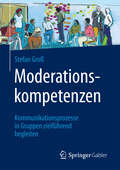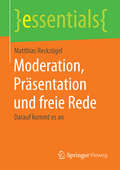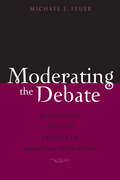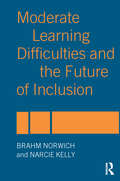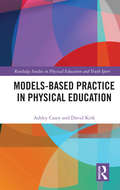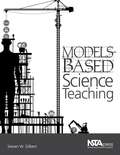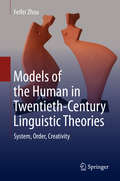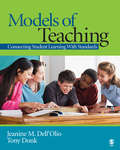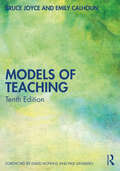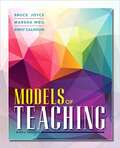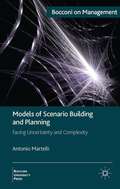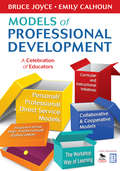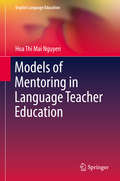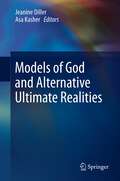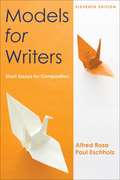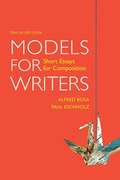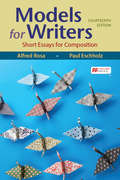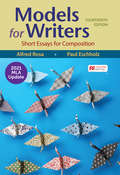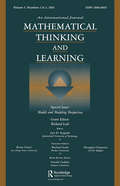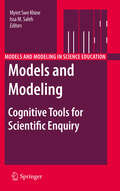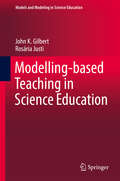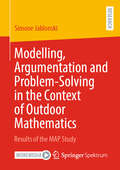- Table View
- List View
Moderationskompetenzen
by Stefan GroßDieses Buch vermittelt kompakt und fundiert Moderationskompetenz für alle, die Besprechungen, Meetings, Workshops oder Projektrunden erfolgreich leiten wollen. Wo dies gelingt, werden Kommunikationsprozesse in Gruppen zu zielorientierten, effektiven und effizienten Ergebnissen führen. Der Autor zeigt systematisch auf, wie der Informationsaustausch in solchen Gesprächsrunden klug vorgedacht, dynamisch begleitet und wirkungsvoll gesteuert werden kann. Die Basis dafür ist ein geklärtes Rollen-, Aufgaben- und Kompetenzverständnis. Mit zielführenden Fragen, methodischen Impulsen und unterschiedlichen Formaten der Beteiligung gelingt es, gemeinsam in der Gruppe Probleme zu lösen, Konflikte zu klären, nachhaltige Ideen zu entwickeln und gute Entscheidungen zu treffen. Am Ende solcher Veranstaltungen steht ein Mehrwert für alle: zufriedene Teilnehmer, tragfähige Resultate und eine kooperative Besprechungskultur, die die Grundlage für einen dauerhaften Unternehmenserfolg bilden.
Moderation, Präsentation und freie Rede: Darauf kommt es an (essentials)
by Matthias ReckzügelMatthias Reckzügel liefert eine praktische Sammlung kurz gefasster Tipps und Tricks für die erfolgreiche Durchführung von Moderationen und Präsentationen – von der Gestaltung von Foliensätzen, deren Präsentation bis hin zur Moderation von Vorträgen und Diskussionen sowie dem Umgang mit Störungen. Der Autor legt hier ein essential vor – eine Darstellung der wesentlichen Anforderungen zur kurzfristigen Umsetzung. Denn dies ist klar: Um eine Moderation oder Präsentation kommt heute kaum jemand herum! Es sind wichtige, nicht zu vernachlässigende und nicht zu unterschätzende Aufgaben in Studium und Beruf, zu denen die Leserinnen und Leser hier vielfältige Anregungen finden.
Moderating the Debate: Rationality and the Promise of American Education
by Michael J. FeuerModerating the Debate is a major statement on education research, policy, and reform that will be required reading for everyone with a stake in improving America's schools. This eloquent book examines the complex--and often problematic--relations between education research, policy, and practice, and proposes ways to improve those relationships in the interest of meaningful education reform. Based on the Burton and Inglis Lectures, which Michael Feuer delivered at the Harvard Graduate School of Education in 2004 and 2005, the book begins with an examination of how recent developments in cognitive science have fundamentally changed the way we understand human decisionmaking and rational judgment. It then proceeds to a consideration of how the lessons of cognitive science might inform a more rational--and reasonable--approach to education research, policy, and reform. Moving deftly and with great insight through the worlds of education research and policymaking, Feuer offers practical solutions to the impasses and disconnections that have chronically thwarted workable, sustained education reform.
Moderating the Debate: Rationality and the Promise of American Education
by Michael J. FeuerModerating the Debate is a major statement on education research, policy, and reform that will be required reading for everyone with a stake in improving America's schools. This eloquent book examines the complex—and often problematic—relations between education research, policy, and practice, and proposes ways to improve those relationships in the interest of meaningful education reform. Based on the Burton and Inglis Lectures, which Michael Feuer delivered at the Harvard Graduate School of Education in 2004 and 2005, the book begins with an examination of how recent developments in cognitive science have fundamentally changed the way we understand human decisionmaking and rational judgment. It then proceeds to a consideration of how the lessons of cognitive science might inform a more rational—and reasonable—approach to education research, policy, and reform. Moving deftly and with great insight through the worlds of education research and policymaking, Feuer offers practical solutions to the impasses and disconnections that have chronically thwarted workable, sustained education reform.
Moderate Learning Difficulties and the Future of Inclusion
by Brahm Norwich Narcie KellyChildren with mild to moderate learning difficulties (MLD) make up the largest sub-group of children requiring special educational needs, and yet they are often neglected in terms of research and in their influence on future Government policies. This book, based on a Nuffield Foundation research project, considers the perspectives of children with moderate learning difficulties, reviewing relevant issues such as:* identification of children with MLD;* appropriate curriculum and pedagogy;* inclusion in mainstream schools; * their identity and self-perception.The authors weave their findings into a wider review of current research in the MLD field and use a range of perspectives, from the professional, to psychological and sociological.This is a contemporary look at MLD that discusses the historical and policy context , origins and justification for having a category for MLD. Students, researchers, and academics that are active in the field of inclusive education will find this an insightful and comprehensive text.
Models-based Practice in Physical Education (Routledge Studies in Physical Education and Youth Sport)
by David Kirk Ashley CaseyThis book offers a comprehensive synthesis of over 40 years of research on models in physical education to suggest Models-based Practice (MbP) as an innovative future approach to physical education. It lays out the ideal conditions for MbP to flourish by situating pedagogical models at the core of physical education programs and allowing space for local agency and the co-construction of practice. Starting from the premise that true MbP does not yet exist, the book makes a case for the term "pedagogical model" over alternatives such as curriculum model and instructional model, and explains how learners’ cognitive, social, affective and psychomotor needs should be organised in ways that are distinctive and unique to each model. It examines the core principles underpinning the pedagogical models that make up MbP, including pedagogical models as organising centres for program design and as design specifications for developing local programs. The book also explores how a common structure can be applied to analyse pedagogical models at macro, meso and micro levels of discourse. Having created a language through which to talk about pedagogical models and MbP, the book concludes by identifying the conditions - some existing and some aspirational - under which MbP can prosper in reforming physical education. An essential read for academics, doctoral and post-graduate students, and pre-service and in-service teachers, Models-based Practice in Physical Education is a vital point of reference for anyone who is interested in pedagogical models and wants to embrace this potential future of physical education.
Models-Based Science Teaching
by Steven W. GilbertIn this book, Steven Gilbert explores the concept of mental models in relation to the learning of science, and how we can apply this understanding when we teach science. Practising science teachers at all levels who want to explore new and better ways to frame and model science will find value in this book.
Models of the Human in Twentieth-Century Linguistic Theories: System, Order, Creativity
by Feifei ZhouThis book provides a refreshingly new perspective for investigating linguistic texts, which foregrounds models of the human. It presents a close reading of major linguistic theories in the twentieth century with a focus on three main themes: linguistic system and the individual speaker; social order; and linguistic creativity. The examination of these three fundamental themes concerning language and human nature, on the one hand, provides a fine-textured exposition on the implicit and explicit models of human nature endorsed by major theorists; on the other, it reveals the methodological dilemmas faced by linguistics. In light of the fact that the importance of considering posthumanist ideas is increasingly being underscored today, both within and outside linguistics, this focus on the human makes the book highly topical.
Models of Teaching: Connecting Student Learning With Standards
by Dr Jeanine M. Dell'Olio Dr Tony DonkModels of Teaching: Connecting Student Learning with Standards features classic and contemporary models of teaching appropriate to elementary and secondary settings. Authors Jeanine M. Dell'Olio and Tony Donk use detailed case studies to discuss 10 models of teaching and demonstrate how they can be connected to state content standards and benchmarks, as well as technology standards. This book provides readers with the theoretical and practical understandings of how to use models of teaching to both meet and exceed the growing expectations for research based instructional practices and student achievement.
Models of Teaching
by Bruce Joyce Emily CalhounThis fully updated edition of a classic text explores established approaches to teaching that are grounded in research and experience to ensure high levels of learning.Models of Teaching combines rationale and research with real-life examples and applications in the classroom, showing how teachers professional learning communities, and school faculties can improve student attainment. The volume contains the major psychological and philosophical approaches to teaching and schooling, including thoroughly documented research on the models of teaching and their effects on student success, and offers teachers the tools to accelerate student learning. Features include: three completely new chapters covering the origins of models in teaching, explicit strategy instruction and metacognition for teaching reading comprehension, and best practices for teachers coaching other teachers, expanding instruction, and supporting school renewal; scenarios for each model to explore the concepts in action; discussions of research relevant to each model throughout the text; advice from the authors about the use of the models in teaching; support for incorporating the language arts and science standards and supporting STEM instruction. With the aim of providing a strong impact on student achievement while keeping in line with the current emphasis on standards-based education, this classic resource will be essential reading for pre-service and new teachers as well as current teaching professionals.This text is supported by extensive multimedia materials, including video demonstrations of the models in action, PowerPoint slides and an Instructor’s Manual, available at www.modelsofteaching.org.
Models of Teaching
by Emily Calhoun Bruce R. Joyce Marsha WeilModels of Teaching: The Heart of the Core gives readers well-developed approaches to teaching, grounded in research and experience and designed to ensure the high levels of learning they are intended to generate. <p><p>With the goal of providing the strongest positive effect on student achievement while keeping in line with the current emphasis on standards-based education, Models of Teaching pairs rationale and research with real-world examples and applications to provide a strong foundation for future and new educators. The book encompasses all of the major psychological and philosophical approaches to teaching and schooling, includes thoroughly documented research on the various models of teaching and their subsequent positive effects on student success, and gives teachers the tools they need to build strong classrooms that accelerate student learning.
Models of Scenario Building and Planning
by Antonio MartelliModels of Scenario Building and Planning offers a unique and innovative exploration of the scenario approach. Importance is given to analysis of the competitors' behaviour. If Models of Scenario Building Planning (MSBP) is there to serve strategy, it should consider (with the utmost care) the interaction between the company and its competitors as well as the possible consequences. For example, when we talk about the company environment, we should never forget that it is not made just by impersonal economic or social forces, but also, if not foremost, by specific human actors, the competing companies. This book also focuses on the analysis of risk and uncertainty in MSBP (avoiding, however, any excessive technicalities). Risk can be defined as the probability of non-success: MSBP should stress not only the advantages of a strategy based on the scenario which will eventually materialise, but also the losses incurred by betting on the wrong scenarios. This is a point which has not received adequate attention in the relevant literature. The importance of the link between scenarios and strategies is also explored, that is, how strategies can be worked out on the basis of the scenarios which have been built.
Models of Professional Development: A Celebration of Educators
by Bruce Joyce Emily CalhounIdentifying the major contemporary models of staff development, this comprehensive resource shows educational leaders how models can be effectively designed and implemented to meet the multifaceted professional development needs of any school. Emphasizing the essential connection to student outcomes, the authors unpack and analyze types and variations of models and provide concrete guidelines for initiating, assessing, and improving a model's impact on learning. Grounded in current research, the book provides an in-depth examination of: - Models to support individuals - Collaborative personal/professional direct service models, e. g. , mentoring and coaching - Collaborative and cooperative models - Models designed to achieve curricular and instructional change.
Models of Mentoring in Language Teacher Education
by Hoa Thi Mai NguyenThis volume examines the theoretical and practical issues related to mentoring/peer mentoring as a support and development strategy for both pre-service and in-service language teachers, and thereby offers a practical and empirical introduction to the field. A stimulating and thorough examination of mentoring and peer mentoring, integrating theory and practice as applied in language teacher education in an Asian specific context. The author discusses findings from a variety of qualitative and quantitative research studies in the light of previous research and in the context of teacher learning theories. Teachers, teacher educators, teacher trainers, supervisory coordinators and administrators will find practical advice, while the volume will be a valuable source of research information for researchers in teacher education and EFL teacher education, in particular for those who wish to employ mentoring or peer mentoring as an approach to teachers' professional development.
Models of Man: Explorations in the Western Educational Tradition
by Paul NashThis book has a single motif and a dual purpose. Its motif is the portrayal of a number of the most influential models of the educated person that have been created as part of the Western cultural tradition. This motif is not meant to be exhaustive but is presented as one way in which that tradition might be plumbed. The purposes are to engender in the reader a broad knowledge of some of the dominant and persistent ideas and problems inherent in his own intellectual tradition; and to stimulate him to go further into the original sources of this tradition in search of meanings and insights that are uniquely relevant to his own educational development.
Models of God and Alternative Ultimate Realities
by Jeanine Diller Asa KasherThe envisioned volume is a collection of recent essays about the philosophical exploration, critique and comparison of (a) the major philosophical models of God, gods and other ultimate realities implicit in the world's philosophical schools and religions, and of (b) the ideas of such models and doing such modeling per se. The aim is to identify exactly what a model of ultimate reality is; create a comprehensive and accessible collection of extant models; and determine how best, philosophically, to model ultimate reality, if possible and desirable.
Models of Decision-Making
by Paul WeirichClassical decision theory evaluates entire worlds, specified so as to include everything a decision-maker cares about. Thus applying decision theory requires performing computations far beyond an ordinary decision-maker's ability. In this book Paul Weirich explains how individuals can simplify and streamline their choices. He shows how different 'parts' of options (intrinsic, temporal, spatiotemporal, causal) are separable, so that we can know what difference one part makes to the value of an option, regardless of what happens in the other parts. He suggests that the primary value of options is found in basic intrinsic attitudes towards outcomes: desires, aversions, or indifferences. And using these two facts he argues that we need only compare small parts of the options we face in order to make a rational decision. This important book will interest readers in decision theory, economics, and the behavioral sciences.
Models for Writers: Short Essays for Composition (11th Edition)
by Paul Eschholz Alfred RosaIt's a simple, best-selling combination that has worked for thousands of students -- short, accessible essays and helpful, thorough writing instruction. Models for Writers continues to offer thought-provoking selections organized to demonstrate not only the rhetorical patterns that students will use in their own essays but also the elements and language that will make those essays effective. This edition offers more coverage of the key elements of academic writing, including new strategies for writing a research paper and a section on writing a reflective essay. Read the preface.
Models for Writers: Short Essays for Composition
by Paul Eschholz Alfred RosaIt’s a simple, best-selling combination that has worked for over 20 years — short, accessible essays and helpful, thorough writing instruction. Models for Writerscontinues to offer thought-provoking selections organized to demonstrate not only the rhetorical patterns that students will use in their own essays but also the elements and language that will make those essays effective.
Models for Writers: Short Essays for Composition
by Paul Eschholz Alfred RosaModels for Writers provides brief, compelling readings similar in length to the essays you’ll be assigned to write in college. Step-by-step advice for writing includes definition, compare and contrast, and more, with additional coverage of the elements of the essay, using sources, and research papers.
Models for Writers with 2021 MLA Update: Short Essays for Composition
by Paul Eschholz Alfred RosaThis ebook has been updated to provide you with the latest guidance on documenting sources in MLA style and follows the guidelines set forth in the MLA Handbook, 9th edition (April 2021).Models for Writers provides brief, compelling readings similar in length to the essays you’ll be assigned to write in college. Step-by-step advice for writing includes definition, compare and contrast, and more, with additional coverage of the elements of the essay, using sources, and research papers.
Models and Modeling Perspectives: A Special Double Issue of mathematical Thinking and Learning
by Richard LeshThis special issue of Mathematical Thinking and Learning describes models and modeling perspectives toward mathematics problem solving, learning, and teaching. The concern is not only the mature forms of models and modeling in communities of scientists and mathematicians, but also the need to initiate students in these forms of thought. The contributions of this issue suggest a variety of ways that students (children through adults) can be introduced to highly productive forms of modeling practices. Collectively, they illustrate how modeling activities often lead to remarkable mathematical achievements by students formerly judged to be too young or too lacking in ability for such sophisticated and powerful forms of mathematical thinking. The papers also illustrate how modeling activities often create productive interdisciplinary niches for mathematical thinking, learning, and problem solving that involve simulations of similar situations that occur when mathematics is useful beyond school.
Models and Modeling
by Myint Swe Khine Issa M. SalehThe process of developing models, known as modeling, allows scientists to visualize difficult concepts, explain complex phenomena and clarify intricate theories. In recent years, science educators have greatly increased their use of modeling in teaching, especially real-time dynamic modeling, which is central to a scientific investigation. Modeling in science teaching is being used in an array of fields, everything from primary sciences to tertiary chemistry to college physics, and it is sure to play an increasing role in the future of education. Models and Modeling: Cognitive Tools for Scientific Enquiry is a comprehensive introduction to the use of models and modeling in science education. It identifies and describes many different modeling tools and presents recent applications of modeling as a cognitive tool for scientific enquiry.
Modelling-based Teaching in Science Education
by John K. Gilbert Rosária JustiThisbook argues that modelling should be a component of all school curricula thataspire to provide 'authentic science education for all'. The literature onmodelling is reviewed and a 'model of modelling' is proposed. The conditionsfor the successful implementation of the 'model of modelling' in classrooms areexplored and illustrated from practical experience. The roles of argumentation,visualisation, and analogical reasoning, in successful modelling-based teachingare reviewed. The contribution of such teaching to both the learning of keyscientific concepts and an understanding of the nature of science areestablished. Approaches to the design of curricula that facilitate theprogressive grasp of the knowledge and skills entailed in modelling areoutlined. Recognising that the approach will both represent a substantial changefrom the 'content-transmission' approach to science teaching and be inaccordance with current best-practice in science education, the design ofsuitable approaches to teacher education are discussed. Finally, the challengesthat modelling-based education pose to science education researchers, advancedstudents of science education and curriculum design, teacher educators, publicexaminers, and textbook designers, are all outlined.
Modelling, Argumentation and Problem-Solving in the Context of Outdoor Mathematics: Results of the MAP Study
by Simone JablonskiMathematics outside the classroom – this work examines the characteristics of outdoor mathematics in more detail. Leaving the classroom to discover mathematics in the environment has several potential benefits for mathematics, e.g. the acquisition of skills and competencies. By means of an empirical study with secondary school students, the competencies of modelling, argumentation and problem-solving are taken into consideration. Therefore, the work outdoors at real objects is compared to the work inside the classroom. Similarities and differences are reported from three different perspectives: an observation perspective, the students&’ perceptions perspective and a digital enrichment perspective. The results contribute to the question of what characterizes the work outdoors at real objects.
